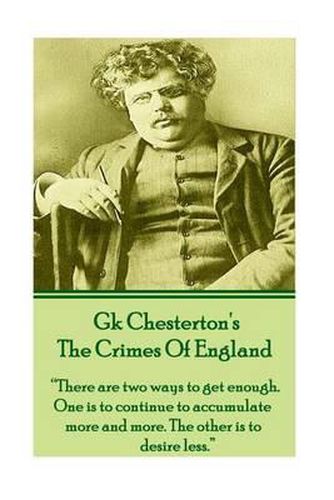Readings Newsletter
Become a Readings Member to make your shopping experience even easier.
Sign in or sign up for free!
You’re not far away from qualifying for FREE standard shipping within Australia
You’ve qualified for FREE standard shipping within Australia
The cart is loading…






There are two ways to get enough. One is to continue to accumulate more and more. The other is to desire less. Gilbert Keith Chesterton, (29 May 1874 - 14 June 1936) was a poet, novelist, playwright, literary commentator, editor, biographer, journalist, orator and theologian. He was often dubbed as the prince of paradox for his light whimsical style that often addressed serious issues such as politics and religion, .. The latter was as a member and defender of the Christian faith and the former was shaped by a distrust of concentrated wealth and power. He advocated Distributionism and said that every man should be allowed to own three acres and a cow. These political views have spread round the world, crediting Chesterton as the father of the small is beautiful movement. It is also said to have influenced Gandhi in seeking a genuine nationalism for India rather than imitating the British state. As one of the world’s most prolific writers, his main claim to fame is as the creator of Father Brown, but Chesterton’s style and ideas in this work reveals a truth that makes it remarkably contemporary and relevant to the modern reader. G. K. Chesterton was a true patriot and felt that the love for his country should not make him blind to England’s support of Prussia that allowed it to get away with political bullying and territorial acquisitions over a period of years and ultimately meant it was not blameless in World War I. He is also critical at England’s response to the French Revolution and the rise of Napoleon as well as in Ireland.. This is a fascinating and very different look at the domestic debate of the time and includes the slogan every citizen is a revolution
$9.00 standard shipping within Australia
FREE standard shipping within Australia for orders over $100.00
Express & International shipping calculated at checkout
Stock availability can be subject to change without notice. We recommend calling the shop or contacting our online team to check availability of low stock items. Please see our Shopping Online page for more details.
There are two ways to get enough. One is to continue to accumulate more and more. The other is to desire less. Gilbert Keith Chesterton, (29 May 1874 - 14 June 1936) was a poet, novelist, playwright, literary commentator, editor, biographer, journalist, orator and theologian. He was often dubbed as the prince of paradox for his light whimsical style that often addressed serious issues such as politics and religion, .. The latter was as a member and defender of the Christian faith and the former was shaped by a distrust of concentrated wealth and power. He advocated Distributionism and said that every man should be allowed to own three acres and a cow. These political views have spread round the world, crediting Chesterton as the father of the small is beautiful movement. It is also said to have influenced Gandhi in seeking a genuine nationalism for India rather than imitating the British state. As one of the world’s most prolific writers, his main claim to fame is as the creator of Father Brown, but Chesterton’s style and ideas in this work reveals a truth that makes it remarkably contemporary and relevant to the modern reader. G. K. Chesterton was a true patriot and felt that the love for his country should not make him blind to England’s support of Prussia that allowed it to get away with political bullying and territorial acquisitions over a period of years and ultimately meant it was not blameless in World War I. He is also critical at England’s response to the French Revolution and the rise of Napoleon as well as in Ireland.. This is a fascinating and very different look at the domestic debate of the time and includes the slogan every citizen is a revolution